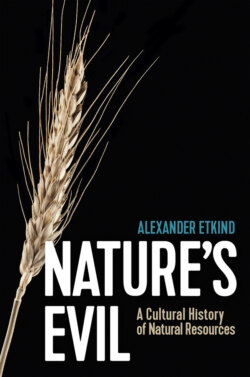Nature's Evil

Реклама. ООО «ЛитРес», ИНН: 7719571260.
Оглавление
Alexander Etkind. Nature's Evil
Table of Contents
Guide
Pages
Series Title. New Russian Thought
NATURE’S EVIL. A Cultural History of Natural Resources
Copyright Page
Acknowledgements
Introduction
Notes
Notes
PART ONE HISTORY OF MATTER
Note
ONE Cry Fire
Not slash, but burn
Roman fires
Ships
Deforestation of Europe
Notes
TWO Grain’s Way
The bog civilisation
The grain hypothesis
Crop rotation
Improvements and indolence
Supplying the capitals
War and potatoes
Space and power
Notes
Notes
THREE The Remains of Foreign Bodies
Meat
Vegetarianism
Fish
Fur
Squirrel
Sable
Beaver
The sea otter
Notes
Notes
FOUR Sugar and Spice and All Things Nice
Salt
Sugar
Islands in the ocean
Aftertaste
Opium
Colonies and calories
Note
Notes
FIVE Fibres
Silk
Hemp and flax
Hemp and the Oprichnina
Hemp and Napoleon
Wool and the Mesta
Leviathan in sheep’s clothing
Cotton
Proto-industry
The birth of the proletariat
Uzbek cotton, Russian textiles
Notes
Notes
SIX Metals
Bronze
Iron
Fugger
Luther
America
Alchemy
Cameralism
The Demidovs
Note
Notes
PART TWO HISTORY OF IDEAS
Notes
SEVEN Resources and Commodities
Natura vastata
The light, the rare and the dry
Sweet refinement
Mono-resource as an economic platform
The gold standard
Note
Notes
EIGHT Resource Projects
Robinson Crusoe on the British Isles
Darien
The regent and coffee
John Law
Cantillon
Note
Notes
NINE Labour and the Mercantile Pump
The benefit of colonies
Two monopolies
Undivided labour
A live monster
Two pumps
Notes
Notes
TEN The Resources that Failed
Anti-imperial France
Post-colonial America
Malthus
Jevons
Keynes
Notes
PART 3 HISTORY OF ENERGY
ELEVEN Peat
Notes
TWELVE Coal
Water power
Ghost acres
Strikes
The Mitchell thesis
Note
Notes
THIRTEEN Oil
Fountains and pipes
Farflung corners
The blood of nations
The petrostate
The science of curses
Carbon and gender
The oil standard
The Russian disease
The carbon standard
Oil into food
Destroying society
Notes
Conclusion: Leviathan or Gaia
The Gaia hypothesis
The parasitic state
Progress and the katechon
Four justices
Note
Notes
References and Bibliography
Index
POLITY END USER LICENSE AGREEMENT
Отрывок из книги
The publication of this series was made possible with the support of the Zimin Foundation
Translated by Sara Jolly
.....
In the middle of the seventeenth century, Paris consumed 3 million bushels of grain per year, Amsterdam, 1.5 million, Rome 1 million. Transporting such quantities of grain by cart was impossible – all growing cities were situated near the sea or navigable rivers. The shortage of grain was a constant problem for Mediterranean cities. As early as the sixteenth century, Dutch ships had transported grain to them from the Baltic lands, sailing around Europe. Amsterdam was supplied from the Polish lands around Danzig, while Stockholm depended on the fields of Livonia and Estonia. The provisioning of London was helped when the East Anglian fens were drained and large farms were established on the reclaimed fenland. Paris was kept supplied via the Seine and the canals built by Colbert. Completed in 1734, this network deprived provincial France of supplies, and local riots accompanied the growth of the capital.14
The delivery of grain to the new capital, St Petersburg, was to become a perennial problem for the Russian Empire. Having occupied the delta of the Neva in 1703, Peter I appreciated its similarities to the situation of Amsterdam, where he had spent the best time of his youth. The Baltic route to Europe was three times shorter than the White Sea route around Scandinavia. Impatient to join the Northern trade, the newly proclaimed empire turned this freshly captured Swedish colony into its capital city and resettled many thousands of people there. It had to supply them with grain and other essentials of life.
.....